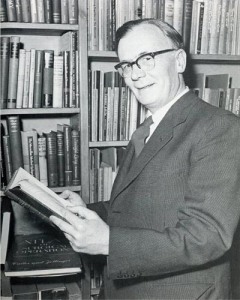The Wounded Healer: Bible Scholar J B Phillips’ Mental Health Struggles
J.B. (John Bertram) Phillips (1906-1982) is remembered today chiefly for his paraphrase of the New Testament: The New Testament in Modern English. A canon in the Anglican church, he realised that people did not easily understand the English of the Authorised Version, so he began his own, readable version in the air-raid shelters of London during the Blitz of 1941. It was described by one reviewer as “making St. Paul sound as contemporary as the preacher down the street” and “transmitting freshness and life across the centuries”.
What is less well known is that Phillips suffered mental affliction for many years – and wrote about it. It seems his father was never satisfied with anything John did as he was growing up. This turned him into a perfectionist. Yet, because he was always falling short of his own standards, he constantly struggled with self-recrimination and a fear of failure. He could not bear any criticism.
Phillips received hours of counselling, but to little avail. Throughout his life, even as he helped others with their spiritual doubts, he knew mental troubles of his own (including ‘visitations’ from C S Lewis, who was already dead). Yet he never let the fears and guilt overcome him. He worked hard, writing, counselling and addressing large audiences.
One fruit of his struggles is that Phillips thought through the dark things of human life, prayed, then wrote about them. Here is how he describes his battles:
“I can with difficulty endure the days, but I frankly dread the nights. The second part of almost every night of my life is shot through with such mental pain, fear and horror that I frequently have to wake myself up in order to restore some sort of balance.”
His writings offer a rational, sensible account of the Christian faith, devoid of frills and triumphalism. It is no surprise that his biography, by his widow Vera and Edwin Robertson, is called The Wounded Healer – because this is what Phillips became. They write:
“While he was ministering to others he was himself powerfully afflicted by dark thoughts and mental pains. He knew anxiety and depression from which there was only temporary release. And while he never lost his faith in God, he never ceased to struggle against mental pain.”
Phillips won through, in part, by choosing to be a giver. Through his books and his wide correspondence, he ministered to people going through their own darkness. At times, the most helpful thing he could offer was his own experience. In one letter to a fellow struggler he wrote:
“As far as you can, and God knows how difficult this is, try to relax in and upon Him. As far as my experience goes, to get even a breath of God’s peace in the midst of pain is infinitely worth having.”
Perhaps, in the final resort, Phillips’ experience was akin to his paraphrase of 1 Peter 5:7 : “You can throw the whole weight of your anxieties upon him, for you are his personal concern.”



Philips is what we can call “real human and real hero”. To think about this guy helps me with my own stuggles. Thanks!
Hi Trevor. I would like to read that biography
Well. That’s a surprise. Had no idea there were so many of us.
Thank you so much for sharing this information about J.B. Phillips. Can you share where you got his biographical information and also the quotes that you used? Is all of this information from his wife’s book? Thank you so much for any help you can give me.
Hi Darla. I’m pleased that what I wrote was useful to you. For this post, my source was indeed Vera Phillips’ biography “The Wounded Healer.” Any other online article tends to go back to that.
Thank you, Trevor, for your email replies on both of these posts. I very much appreciate your quick and thorough responses. The depression that I deal with is often characterized by a sense that God is not good or not good to me – as Luther put it. It is so very encouraging to know that there are past saints with strong faith who wrestled in this same way. I began my internet search and found your articles because of references from a book called, “Why Do Christians Shoot Their Wounded,” by Dwight L Carlson. If you aren’t familiar with this book, you might like it. It was published in the early 90’s – I wish someone would update it. (BTW, I tried to reply to the email following the instructions, but was unable to…) Thanks again!
The Carlson book certainly looks interesting – I shall look around for a copy! I’m not sure why the email didn’t work. If you simply copy trevorsaxby@gmail.com into your client email, it should work fine. It would be good to share more. Bless you!
So glad that I found this information. I often feel so lonely and depressed and I wonder if I’m the only Christian out there that struggles. I have a deeply introspective mind that never shuts off and the noise is sometimes unbearable. I just keep taking it to Jesus. This has been a great resource. Steve Browns book “Hidden Agendas – Dropping the masks that keep us apart” helped as well.
Thank you so much for your encouraging comment, Robert. I too have known deep, dark valleys, and in counselling others in a church context I have met many dear people who have a sincere faith but still experience times when they cannot rise to embrace the fullness that they know God has for them. One important help is to have one or two close and supportive friends who just listen, accept and support in love – and don’t try to constantly advise you! Do you have relationships like that? I don’t know Brown’s book but I’ll take a peek.